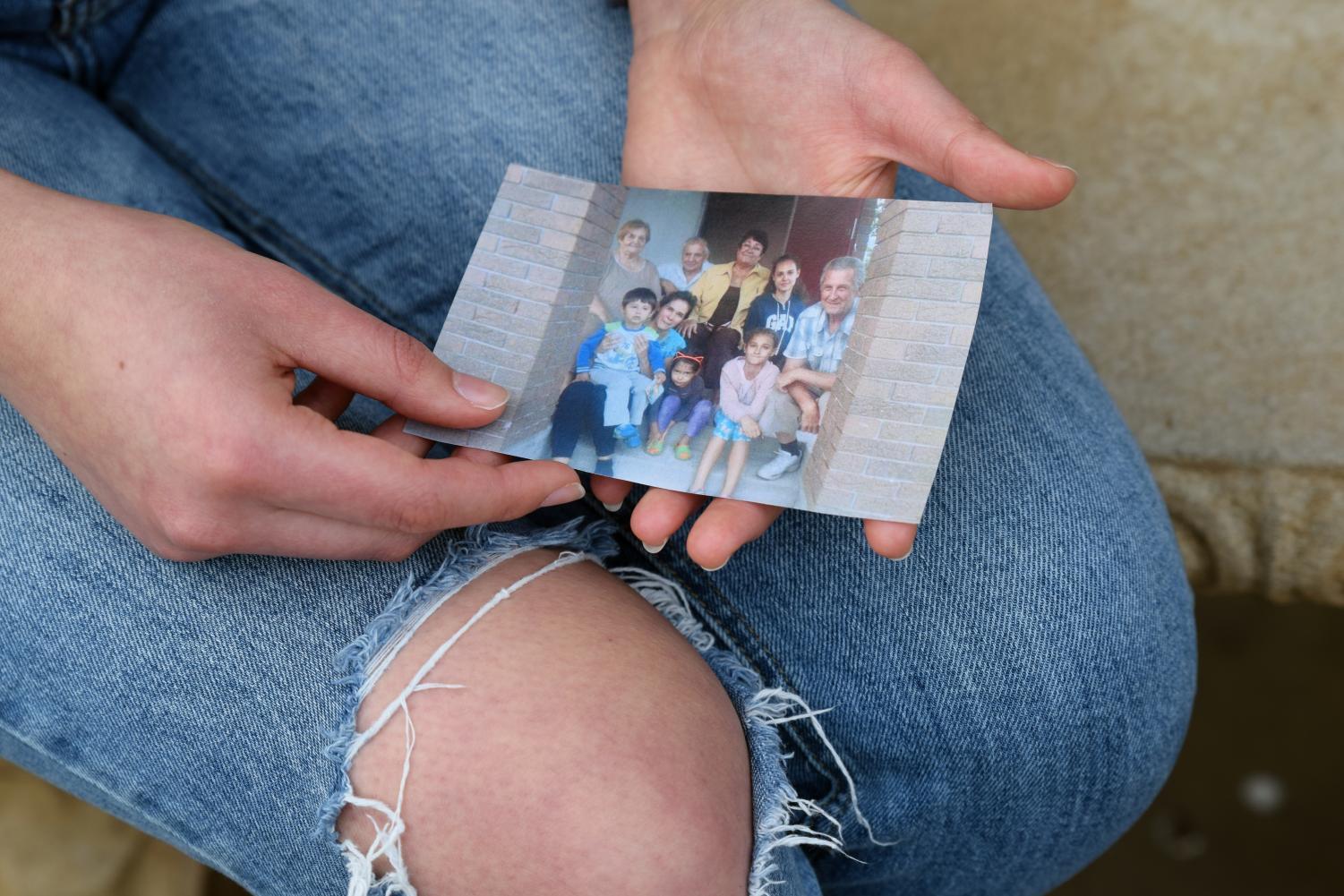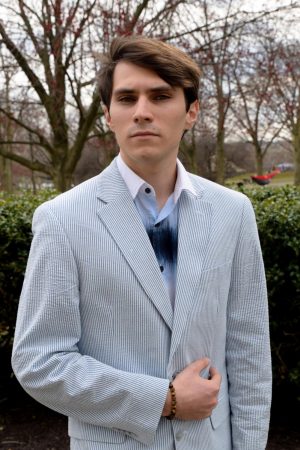‘Being Ukrainian and being a student’: Ukrainian Pitt students reflect on war


Anna Libikh holds a photo of her family who live in Ukraine.
A fire alarm went off during spring break in Oleksii Kucherenko’s family apartment in Miami.
Kucherenko, a first-year microbiology student originally from Ukraine, said this was not out of the ordinary, so he closed his books, turned off his bedroom lights and made his way to the exit of his parents’ apartment. While walking, he heard his grandmothers begin to cry.
“I’m like, ‘What’s going on? What happened? Why are you crying?’ And they kept saying, ‘Are they trying to bomb us?’” Kucherenko said. “I told them, ‘No, we’re in the United States. Everything is fine here. You’re safe.’”
Russian forces invaded Ukraine more than three weeks ago on Feb. 24, starting a war that is ongoing. According to the United Nations, there have been 2,246 confirmed civilian casualties, with 847 killed and 1,399 injured, as of Saturday. A UN agency said it “believes that the actual figures are considerably higher, especially in government-controlled territory and especially in recent days.”
When Russian forces first started attacking Kyiv on the night of Feb. 24, Kucherenko’s grandparents quickly gathered important documents and ran to the nearest bomb shelter, located in their local hospital’s basement. They fled Ukraine soon after via the Hungarian border before entering Poland and boarding a flight to the United States. They are now staying with Kucherenko’s parents in their Florida apartment.
Kucherenko said he sometimes sees one of his grandmothers “trembling when she hears the sound of the washing machine” because, according to Kucherenko, it reminds her of the sounds of bombings.


(Clare Sheedy | Assistant Visual Editor)
Yulia Davyda, a first-year undeclared business student, returned this spring break to her home in the South Hills. Davyda is a Pennsylvania native, but both of her parents are from Ukraine. She said that she “could feel that there was worry” when she went home last week.
“Something seemed off every day, just the tension — not with each other, but with the world and with our worry,” Davyda said, “[My parents] seemed more on their phones, checking the news and checking in with people.”
Davyda has family in Lviv, Kyiv and around Mariupol, among Ukraine’s largest cities. She said they’re all staying in the country, except for one cousin who managed to cross the border into Poland. One family member has a newborn and often finds it too hard to leave their home to run to the nearby bunker with their baby. Davyda said “they just turn off the lights when there’s missiles nearby.”
When Davyda first realized Russia had invaded Ukraine, she was making breakfast. She said she woke up, half asleep, the night before to texts and emails from peers, professors and friends offering support. She said “at first, I was really confused because I was half asleep just checking the time.” It didn’t hit her until that morning.
Davyda said she then called her mother and her grandmother, who both live in South Hills, saying her grandmother was already crying when she answered the phone.
“I remember her exact words when she picked up the phone,” Davyda said, “She said, ‘They’re bombing our home.’ She was crying and she was looking at a map of all the places they struck.”
Since then, Davyda said she sometimes feels worried when waking up.
“I missed the first time, when everything first happened. If I stayed up like I usually do, I would have heard about it right away — but now I’m just worried, like, is there going to be something new when I wake up?” Davyda said.
(Clare Sheedy | Assistant Visual Editor)
Anna Libikh, a first-year pre-pharmacy student, immigrated to Bucks County from Kyiv in 2016. Unlike Davyda, she said she was awake in her dark dorm room on the night Russia invaded Ukraine, scrolling through news coverage and texting friends and family.
“I couldn’t even cry. You know, like, it was such a big shock. I was just sitting there helpless and I didn’t know what to do,” Libikh said. “My heart was beating so fast. And then I was like, ‘I need to go to bed because tomorrow I’m not going to function — and I really need to process this tomorrow.’”
She said this spring break was a relief for her, and she needed the time to be with family to process.
“I really needed time to be with my family and talk about all of this — because, in school, I was just like, I couldn’t really do it,” Libikh said. “So I took that week to process all of it, recharge and, now, this week, I’m doing better.”
Compared to before spring break, Libikh said functioning as a student is “easier,” and she realized she “can’t worry all the time,” though she still thinks all day about her friends and family in Ukraine.
“Every day it’s like, ‘Oh, another shelter was bombed, people died,’ and it’s awful. I see all this news, like, every day pretty much,” Libikh said. “At first I couldn’t believe what was happening, but it’s been more than three weeks now. Which is, like, crazy to say, but, yeah, it is happening now. It feels real.”
(Clare Sheedy | Assistant Visual Editor )
Libikh is a member of Pitt’s Ukrainian culture club, along with Kucherenko and Davyda. Libikh said having other Ukrainian students to talk to who are going through the same thing helps her cope. After the first few days of the attacks, Libikh said she often talked with Kucherenko, asking him, “How has this happened?” and, “Can you believe this is true?”
Kucherenko, Libikh and Davyda all stressed the importance of donating to agencies helping provide relief to Ukraine — Pittsburgh-based or not.
Kucherenko said he learned on the day of a chemistry exam that Russian forces had started bombing Vynohradar, the Kyiv neighborhood in which he grew up. He woke up to texts from friends and family with pictures of destroyed homes and schools.
At first, Kucherenko felt “total emptiness.”
“If you were hitting yourself with something, it hurts at first,” Kucherenko said. “But then your body, at the place where you hit, gets red and numb. That’s the feeling, numb. It’s getting worse. You just don’t know.”
Kucherenko said he was able to make it through the exam and, over spring break, told himself he has to set aside his Ukrainian identity to manage school obligations.
“I told myself over the break that I have to separate myself from being Ukrainian and being a student,” Kucherenko said. “Otherwise, I won’t succeed in being a student.”
Recent Posts
Therese Pitman: Giving back to Pitt’s student-athletes with equality
Pitman is Pitt’s Director of Student Athlete Development where she helps student-athletes navigate their career…
Pitt speech and debate team heads to nationals
The William Pitt Debating Union, Pitt’s speech and debate team, sends students to both in-person…
Visuals: A Year in Review
The visuals desk had an interesting year. In the midst of the 2024 Presidential Election,…
De-stress events across campus offer students a break from studying
During finals week, departments across campus are offering wellness events to help students manage stress…
Pitt students share their summer plans
After a long and strenuous academic year, many students are excited to take a break.…
Column | Collaboration and connection make us better — yes, even in journalism
Today is the last day I will ever do this, and despite the amount of…

